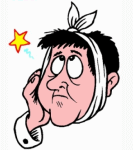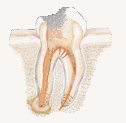
Tooth Pain Causes
A toothache is a sensation of pain around teeth or jaw that may result from a number of causes. Tooth pain causes can be related either to the tooth itself, the tissues around it, or to a completely different non dental health condition. In either case, your dentist can make the proper diagnosis and recommend the necessary treatment.
What Causes Toothache?
A tooth pain is most frequently caused when a tooth nerve becomes irritated or damaged. This irritation may occur either inside the tooth (pulp) or around the tooth (periodontium), but in some cases it may be caused by other conditions not directly related with our teeth.
The most common causes of severe toothache are tooth decay and its complications such as pulpitis and dental abscesses, but many other conditions may also trigger a tooth pain:
Dental related causes of toothache
![]() Tooth Decay - Cavities are the most common suspect when having a toothache.
The acids produced by dental plaque bacteria start to destroy the outer protective tooth structure, the enamel.
When a hole in the enamel (cavity) is formed and tooth decay reaches the soft dentine under the enamel, the tooth becomes sensitive. A sharp intermittent tooth pain is the most common symptom of a small dental cavity.
As the decay spreads inward into the dentine layer, the tooth becomes increasingly more sensitive to temperature and touch.
Tooth Decay - Cavities are the most common suspect when having a toothache.
The acids produced by dental plaque bacteria start to destroy the outer protective tooth structure, the enamel.
When a hole in the enamel (cavity) is formed and tooth decay reaches the soft dentine under the enamel, the tooth becomes sensitive. A sharp intermittent tooth pain is the most common symptom of a small dental cavity.
As the decay spreads inward into the dentine layer, the tooth becomes increasingly more sensitive to temperature and touch.
![]() Pulpitis
– If the tooth decay penetrates through the dentine and reaches the pulp inside the tooth, the pulp tissues become infected and inflamed,
irritating the tooth nerves and sending signals of tooth pain to the brain. The pressure on nerves from the inflammation of the pulp can cause mild to extreme pain, depending upon the extend of the infection.
Pulpitis
– If the tooth decay penetrates through the dentine and reaches the pulp inside the tooth, the pulp tissues become infected and inflamed,
irritating the tooth nerves and sending signals of tooth pain to the brain. The pressure on nerves from the inflammation of the pulp can cause mild to extreme pain, depending upon the extend of the infection.
![]() Tooth Abscess Pain –
Dental abscesses are the main cause of severe toothaches. Pus is accumulated around the tip of the tooth root and the infection starts to damage the periodontal tissues.
You should see your dentist immediately (the severe and continuous throbbing pain will not leave you another option, anyway).
Tooth Abscess Pain –
Dental abscesses are the main cause of severe toothaches. Pus is accumulated around the tip of the tooth root and the infection starts to damage the periodontal tissues.
You should see your dentist immediately (the severe and continuous throbbing pain will not leave you another option, anyway).
![]() Sensitive Teeth – Dentinal sensitivity is a usual cause of tooth pain triggered by cold, heat or touch.
It is a result of exposed dentine micro-tubules which allow external stimuli to reach the nerves of the tooth and irritate them.
Enamel loss due to tooth abrasion, tooth erosion or natural wear and tear can create a sensitivity problem.
Sensitive Teeth – Dentinal sensitivity is a usual cause of tooth pain triggered by cold, heat or touch.
It is a result of exposed dentine micro-tubules which allow external stimuli to reach the nerves of the tooth and irritate them.
Enamel loss due to tooth abrasion, tooth erosion or natural wear and tear can create a sensitivity problem.
![]() Gum Recession – Receding gums can expose the roots of the tooth and cause a similar problem.
Gum Recession – Receding gums can expose the roots of the tooth and cause a similar problem.
![]() Periodontal Disease
– Gum disease (chronic bacterial infection of the gums) can also be the cause of toothaches, due to irritation of the gums, gum recession or the development of a gum abscess.
Periodontal Disease
– Gum disease (chronic bacterial infection of the gums) can also be the cause of toothaches, due to irritation of the gums, gum recession or the development of a gum abscess.
![]() Tooth Fractures - Cracked Tooth Pain
– When a tooth is fractured or chipped, the tooth may become extremely sensitive due to exposed dentine.
The pain is worse if the damage extends to the center of the tooth and affects the pulp. The condition is known as Cracked Tooth Syndrome.
Tooth Fractures - Cracked Tooth Pain
– When a tooth is fractured or chipped, the tooth may become extremely sensitive due to exposed dentine.
The pain is worse if the damage extends to the center of the tooth and affects the pulp. The condition is known as Cracked Tooth Syndrome.
![]() Wisdom Teeth Pain – Wisdom teeth may be the cause of toothache in several ways.
Impacted wisdom teeth and pericoronitis are the most common related conditions, but in some cases their eruption (even without problems) may cause severe discomfort.
Wisdom Teeth Pain – Wisdom teeth may be the cause of toothache in several ways.
Impacted wisdom teeth and pericoronitis are the most common related conditions, but in some cases their eruption (even without problems) may cause severe discomfort.
![]() Bruxism – Teeth grinding can cause severe enamel loss exposing the dentine, tooth fracture or chips.
Teeth clenching puts the teeth under excessive pressure, irritating the nerves in the jaw and causing a toothache usually extended to several teeth.
Bruxism – Teeth grinding can cause severe enamel loss exposing the dentine, tooth fracture or chips.
Teeth clenching puts the teeth under excessive pressure, irritating the nerves in the jaw and causing a toothache usually extended to several teeth.
![]() TMJ Disorders (TMD) - TMJ Tooth Pain
– Temporomandibular joint disorders caused by injury or irritation of the joint that attaches the jaw to the skull, may cause a soreness to the jaw that may be confused with toothache.
TMJ Disorders (TMD) - TMJ Tooth Pain
– Temporomandibular joint disorders caused by injury or irritation of the joint that attaches the jaw to the skull, may cause a soreness to the jaw that may be confused with toothache.
![]() Damaged restorations – Old fillings or crowns may break or crack leaving exposed the inner tooth structures.
Damaged restorations – Old fillings or crowns may break or crack leaving exposed the inner tooth structures.
![]() Denture Pain – Denture pain is a common problem among denture wearers.
The causative factor is in most cases that the denture does not fit properly on the gums and jaw.
Denture Pain – Denture pain is a common problem among denture wearers.
The causative factor is in most cases that the denture does not fit properly on the gums and jaw.
![]() Dental treatments
– A toothache may follow some dental treatments such as tooth extractions,
root canal therapy,
fillings, crowns or gum surgery.
While some tooth pain or sensitivity may be normal for some days after treatment, you should contact your dentist if the pain persists or worsens as it may be an indication of treatment complications.
Dental treatments
– A toothache may follow some dental treatments such as tooth extractions,
root canal therapy,
fillings, crowns or gum surgery.
While some tooth pain or sensitivity may be normal for some days after treatment, you should contact your dentist if the pain persists or worsens as it may be an indication of treatment complications.
![]() Trapped food - Food debris wedged between teeth or trapped below the gum line can cause irritation and tooth pain.
Trapped food - Food debris wedged between teeth or trapped below the gum line can cause irritation and tooth pain.
![]() Dental Implant Pain
– A dental implant that is not placed properly may cause a toothache. Other problems such as a dental implants infection can also be signaled by tooth pain.
Dental Implant Pain
– A dental implant that is not placed properly may cause a toothache. Other problems such as a dental implants infection can also be signaled by tooth pain.
![]() Teething Pain
- Teething in babies and young children (eruption of primary and permanent teeth), although not a health problem, can often cause discomfort. The eruption of wisdom teeth can also be quite painful.
Teething Pain
- Teething in babies and young children (eruption of primary and permanent teeth), although not a health problem, can often cause discomfort. The eruption of wisdom teeth can also be quite painful.
![]() Tooth Whitening
- Aggressive tooth whitening can damage the tooth enamel exposing the dentine and causing dental pain due to increased tooth sensitivity.
Tooth Whitening
- Aggressive tooth whitening can damage the tooth enamel exposing the dentine and causing dental pain due to increased tooth sensitivity.
Non dental related causes of toothache
![]() Sinusitis - Sinus Toothache – Sinus infections, usually after a cold, may cause what is called a ‘referred toothache’.
Sinuses are empty spaces in the bone, very close above the roots of the upper teeth. Sinus congestion or inflammation often causes a pain that feels like a toothache, affecting mostly the upper molar teeth.
Sinusitis - Sinus Toothache – Sinus infections, usually after a cold, may cause what is called a ‘referred toothache’.
Sinuses are empty spaces in the bone, very close above the roots of the upper teeth. Sinus congestion or inflammation often causes a pain that feels like a toothache, affecting mostly the upper molar teeth.
![]() Ear infections - Infections of the inner or outer ear may also cause a referred pain that resembles a toothache.
Ear infections - Infections of the inner or outer ear may also cause a referred pain that resembles a toothache.
![]() Heart disease
- Angina pectoris, or heart spasm, (caused by inadequate supply of oxygenated blood to the heart muscle because of narrowing of the arteries to the heart) can cause a radiating pain to the left side of the jaw.
Patients with a history of heart disease should be alerted by a sudden toothache, especially if they are in good dental health, as it may be a signal of a heart attack.
Heart disease
- Angina pectoris, or heart spasm, (caused by inadequate supply of oxygenated blood to the heart muscle because of narrowing of the arteries to the heart) can cause a radiating pain to the left side of the jaw.
Patients with a history of heart disease should be alerted by a sudden toothache, especially if they are in good dental health, as it may be a signal of a heart attack.
![]() Trigeminal Neuralgia – The condition affects the trigeminal nerve, which is the main nerve of the face and jaws branching to all teeth.
Trigeminal neuralgia is probably caused when a blood vessel pressures the nerve, and it is characterized by a severe stabbing pain that may feel like it originates from the nerve endings inside the teeth.
Trigeminal Neuralgia – The condition affects the trigeminal nerve, which is the main nerve of the face and jaws branching to all teeth.
Trigeminal neuralgia is probably caused when a blood vessel pressures the nerve, and it is characterized by a severe stabbing pain that may feel like it originates from the nerve endings inside the teeth.
![]() Cluster headaches and migraines
– Immense headaches do often cause the feeling of a dull tooth pain that spreads to all teeth of one side of the head in one or both jaws, possibly due to the irritation of the trigeminal nerve.
Cluster headaches and migraines
– Immense headaches do often cause the feeling of a dull tooth pain that spreads to all teeth of one side of the head in one or both jaws, possibly due to the irritation of the trigeminal nerve.
Since there are so many conditions that may result in a toothache, and the root cause is not always obvious (unless you have a clearly visible injury), the best thing to do after experiencing a toothache is to visit your dentist for diagnosis, and treatment if required.

 Dental Insurance
Dental Insurance Tooth Abscess Pain
Tooth Abscess Pain Tooth Extraction Pain
Tooth Extraction Pain Toothache Medicines
Toothache Medicines